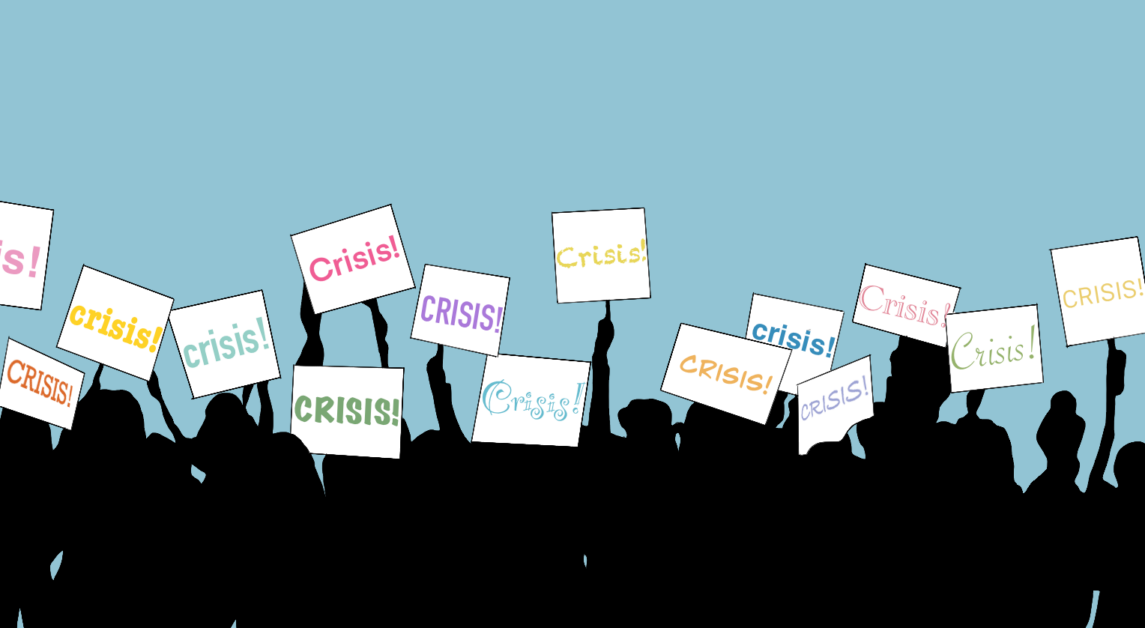Stop whatever you’re doing—we are in a crisis.
America has a housing crisis. The Western world has a well-documented mental health crisis. Microplastics are creating a new physical health crisis. Meanwhile, Ukraine’s crisis and Gaza’s crisis are contributing to the global refugee crisis. Many advocacy groups are now reframing climate change as the climate crisis. We’ve also been in a century-long crisis of modernity, and there are so many ongoing natural disasters that the internet now has an article infotaining us with the “The Top 10 Crises the World Can’t Ignore in 2024.”
If you read all of that, the word “crisis” may have just lost its meaning to you. I wouldn’t blame you, even though I try my best to concern myself with several of the issues I just mentioned.
The unfortunate truth about individual human beings is that our attention is somewhat of a zero-sum game. We can only do (and concern ourselves with) so much stuff. And, when the internet is dragging us in so many different directions—dragging our attention toward so many “crises”—it can often feel impossible to prioritize one issue over another.
What are the bad ways to respond to a purported crisis? And how can one actually make a difference? Answering the first question is much easier than the second.
The first bad response to an apparent crisis is “slacktivism.” This type of person freely accommodates advocacy on the surface, especially through social media. They will try their hardest to listen intently and appear to act, but their outreach is never fully “satisfactory.” No one’s social media page can bring attention to every crisis, and no one’s bank balance can go toward every charity account. The easiest and most common thing they do is flood others’ feeds with more crisis news—diluting the attention of their followers in the process.
The second response is “saviorism.” This kind of person will take their advocacy a step further. Far beyond article reposts and $5 donations, they take their work to the ground level … and muck it up. No region can claim to be a greater victim to these “advocates” than Sub-Saharan Africa, which, as Dipo Faloyin elaborates on in Africa is Not a Country, has seen its reputation tarnished, its economic vitality diminished, and its humanitarian crises accelerated due to the well-meaning but counterintuitive efforts of charities like Band-Aid and Invisible Children.
The third response, and perhaps the easiest, is cynicism. “If everything is a crisis,” one friend of mine said, “then nothing is.” I find it hard to disagree with his line of reasoning—after all, if every advocate tries to amplify their cause with the same kind of dissonant, high-pitched screech, it is much easier to “leave the room” than to engage with them. Better to live in silence than hear about another crisis you can’t do anything about.
So, what can you do? As much as I once wanted to be a cynical robot, I find it much more important to find a vocation I believe in. And, in a world where less and less labor is inherently fulfilling, this means finding a cause—a crisis, even—to feel good about fighting for (or against).
Now this is the part that I dreaded writing because I’ve hated practically every possible solution I’ve heard. “Amplify all voices, especially those affected,” one might say. “Include all facets of experience within the dialogue,” another might argue. If these issues we’re talking about—war, health, displacement, calamity—are actual crises, then they deserve more than lip service about engaging in dialogue. That kind of language is how you create more slacktivists—more useless debate partners generating useless text on useless social media platforms in useless DMs or in useless threads. Humans do not have to be useless in the face of a crisis.
Try a different approach. Don’t just listen to voices across as many issues as you can. Block out most of the noise and prioritize one issue that sincerely resonates with you. Try your best to understand it—yes, that includes listening to different viewpoints—and see where to go from there. That might mean volunteering, donating, calling your congressman, or dropping everything and finding a whole new job. At the end of the day, though, it means something good can come out of your work—and you can count yourself as someone who combated a crisis.













